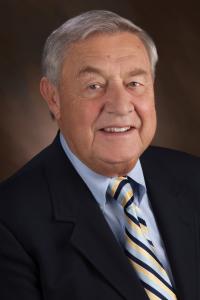John Bossler

NOAA Heritage Oral History Project
NOAA Heritage Oral History Project aims to document the history and legacy of NOAA through compelling interviews with its leaders. These firsthand accounts provide an invaluable resource that preserves NOAA's significant contributions to environmental research and management, fostering a deeper understanding of NOAA's vital role in shaping our understanding of the Earth's oceans and atmosphere.
Molly Graham
Dr. John Bossler was born in Johnstown, Pennsylvania, in 1936. He graduated from the University of Pittsburgh with a degree in civil engineering in 1959 and went to work for the Coast and Geodetic Survey. John earned a master's and PhD in Geodetic Science from Ohio State University. Until 1986, John served as Director of the Coast and Geodetic Survey (C&GS) and the National Geodetic Survey (NGS). As Director of C&GS, he was an Admiral in the NOAA Commissioned Corps. In 1987, Bossler became a professor and Director of the Center for Mapping at Ohio State University. He retired from OSU in 1997 and has been consulting since.
Please Note: The oral histories in this collection are protected by copyright and have been created for educational, research and personal use as described by the Fair Use Doctrine in the U.S. Copyright law. Please reach out Voices@noaa.gov to let us know how these interviews are being used in your research, project, exhibit, etc. The Voices staff can help provide other useful resources related to your inquiry.
The NOAA mission is to understand and predict changes in climate, weather, oceans, and coasts, to share that knowledge and information with others, and to conserve and manage coastal and marine ecosystems and resources. The Voices Oral History Archives offers public access to a wide range of accounts, including historical materials that are products of their particular times, and may contain offensive language or negative stereotypes.
Voices Oral History Archives does not verify the accuracy of materials submitted to us. The opinions expressed in the interviews are those of the interviewee only. The interviews here have been made available to the public only after the interviewer has confirmed that they have obtained consent.
